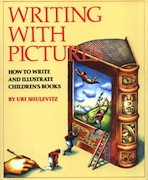Uri Shulevitz interviewed by Anita Silvey
The Horn Book Radio Review

 Listen to the program.
Listen to the program.
 Anita Silvey (AS): I’m Anita Silvey, editor in chief of Horn Book Magazine. The American picture book for children is one of this country’s greatest contributions to world literature. And my guest today, Caldecott Medal Winner, Uri Shulevitz, who illustrated One Monday Morning, Rain Rain Rivers and The Treasure, is one of the finest picture book creators working in the United States today. He is also a distinguished critic of picture books, and his recent critical writings appear in Writing With Pictures: How to Write and Illustrate Children’s Books.
Anita Silvey (AS): I’m Anita Silvey, editor in chief of Horn Book Magazine. The American picture book for children is one of this country’s greatest contributions to world literature. And my guest today, Caldecott Medal Winner, Uri Shulevitz, who illustrated One Monday Morning, Rain Rain Rivers and The Treasure, is one of the finest picture book creators working in the United States today. He is also a distinguished critic of picture books, and his recent critical writings appear in Writing With Pictures: How to Write and Illustrate Children’s Books.
You have a chance, Uri, to look at the work of a lot of contemporary illustrators, what particular things do you see happening in picture books today, or picture books that you were looking at to do this book?
Uri Shulevitz (US): I find a trend toward a tightening in technique. Sort of — sometimes it’s a certain super-realism. I see it in my work as well. My own feeling is that it shows anxiety, that the more the work becomes tight, that is an expression of anxiety. Because I believe the great periods of art didn’t have to do that. In fact they were somewhat looser and in spite of our impressions of High Renaissance, the art was not tight. Another thing — it worries me — is that some of the periods of decadence, like for example during the Greek periods, they were becoming overly sophisticated, where as the classical period, Greek art at it’s height wasn’t as detailed. And I myself find it sometimes in my own work and find it worrisome and my goal is to is to loosen up rather to than to tighten it.
AS: Now sometimes, people take a look at a thirty-two page picture book and they say oh it’s thirty-two pages and it’s so small this must not take much time to produce. How long will it take you to create a picture book?
US: It is very hard to both write — to write and to illustrate something that is very concise. I mean, we all know how difficult it is to to say something concisely, whereas to use many words is much easier, and we a we do that most of the time. So, the fact that it is thirty-two pages should not be an indication, and one should not be misled by that, thinking that it is easy. In fact, there were some well-known authors who have written some very successful books for adults and then when tried writing something which they thought was a picture book, they did not succeed. There is a great deal of elimination and keeping only what is essential. It is not easy. It is very difficult, it’s just that it has its own requirements and its own difficulties, where as writing a novel is not easy either. Any kind of writing isn’t easy, but it’s just that it has different requirements entirely.
AS: You have created some wonderful full color books, but you’ve also done a great deal of work in black and white. Do you enjoy using black and white as a media?
US: There can be a use of color — of many colors — that will give a feeling of black and white, and there can be a use of black and white that has a feeling of color. I think that one can develop one’s eye to be able to tell whether a person has a sense of color by seeing black and white. It has to do with the range of the richness of the grays that one uses, whereas I’ve seen color — I mean both paintings and illustrations in color — they could use any color they wanted, and yet they came up with a feeling that was lacking the feeling of color, because they were only capitalizing on the hues and they forgot other elements of color. And so, I don’t find that it is as limiting when I have to illustrate in color and I say that sometimes it it doesn’t call for color is because there might be a very stark mood or it’s the nature of the story that is best illustrated in black and white.
AS: Uri Shulevitz, author of Writing With Pictures: How to Write and Illustrate Children’s Book. I’m Anita Silvey, editor in chief of Horn Book Magazine.
MUSIC
Child’s Voice: This series of reviews is produced by Greg Fitzgerald and is made possible by the Horn Book Incorporated, publishers of the Horn Book Magazine and books on children’s literature.
MUSIC
RELATED
ALREADY A SUBSCRIBER? LOG IN
We are currently offering this content for free. Sign up now to activate your personal profile, where you can save articles for future viewing.







Add Comment :-
Be the first reader to comment.
Comment Policy:
Comment should not be empty !!!